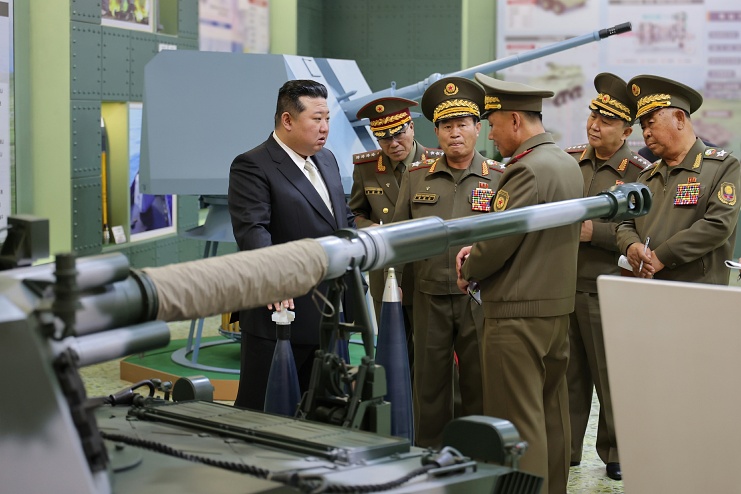 The Rodong Sinmun newspaper reported on May 29, 2024, that North Korean leader Kim Jong Un had visited the Academy of National Defense Science the previous day (May 28) to celebrate the 60th anniversary of its establishment. In the photograph, Kim is seen touring the facility. (Rodong Sinmun, News 1)
The Rodong Sinmun newspaper reported on May 29, 2024, that North Korean leader Kim Jong Un had visited the Academy of National Defense Science the previous day (May 28) to celebrate the 60th anniversary of its establishment. In the photograph, Kim is seen touring the facility. (Rodong Sinmun, News 1)North Korean leader Kim Jong Un has characterized the recent Israel-Iran armed conflict as “a typical conflict between imperialist forces and the defenders of autonomy,” using the Middle East crisis to justify his country’s nuclear weapons program and order significant military upgrades.
During a high-level party meeting on June 18-19, Kim personally directed officials to enhance nuclear weapons capabilities and strengthen command structures, treating Iran’s military response as a strategic model worth emulating.
Strategic lessons from Iran
“The fact that Iran suffered a preemptive attack despite abiding by the NPT demonstrates the wisdom of past supreme leaders in leaving that treaty,” Kim told the assembled officials, according to a high-ranking North Korean source who spoke to Daily NK in late June.
Kim reiterated his regime’s core nuclear doctrine: “Only countries with nuclear capabilities possess true deterrence. When we are threatened, we will exact retribution with our nuclear weapons anywhere on the globe.”
The North Korean leader praised Iran’s calculated response to Israeli airstrikes, saying Tehran had “secured the strategic initiative instead of taking emotional revenge” through its ballistic missile launches. Kim indicated that North Korea would similarly exercise what he called “legitimate self-defense” if faced with comparable threats on the Korean Peninsula.
Kim’s comments reflect North Korea’s broader strategy of using international conflicts to justify its nuclear program while reinforcing the regime’s survival narrative. By invoking the “nuclear retaliation” doctrine formalized in September 2022, Kim sent a clear domestic message about the potential use of nuclear weapons.
“This amounts to advance notice that we will have to make a legitimate military response if we find ourselves in a similar situation,” the source explained. “Since this raises the possibility of not only retaliating automatically to an external attack but also launching a preemptive strike, there’s talk that the regime is thinking not only of possessing, but using, nuclear weapons.”
Following his analysis of the Iran strikes, Kim ordered sweeping changes to North Korea’s nuclear infrastructure and command systems. Noting that nuclear facilities were primary targets in the Middle East conflict, he directed comprehensive protective measures including moving facilities underground, distributing nuclear functions across multiple locations, installing multiple protective layers, creating an independent command structure capable of operating during cyberattacks and electronic jamming, and developing automatic counterattack capabilities.
Kim also highlighted Iran’s drone operations, calling them a “field tactic that offers good value for money,” and demanded urgent improvements to North Korea’s drone regulations. The North Korean leader noted that Iran’s attacks had exposed vulnerabilities in Israel’s “Iron Dome” defense system, advocating for a comprehensive nuclear counterattack strategy that incorporates mobility, sustained bombardment, and precision strikes.
Military cooperation and propaganda
Beyond military applications, Kim ordered the creation of domestic propaganda materials under the slogan “The Iranian people’s defensive war is a model for the Third World.” He emphasized using the conflict to strengthen internal unity and promote anti-American sentiment.
Kim also directed officials to explore expanded military and technical cooperation with anti-American forces in the Middle East, specifically mentioning Iran and Yemen.
North Korea’s foreign ministry reinforced Kim’s messaging through official statements. On June 19, a ministry spokesperson condemned Israel’s airstrikes on Iran as a “crime against humanity” and “a hideous act of aggression wantonly violating the sovereignty and territorial integrity of a sovereign state.”
Following subsequent U.S. airstrikes on Iranian nuclear facilities on June 23, the ministry issued an even stronger denunciation, with KCNA quoting the spokesperson as saying North Korea “strongly condemns the attack on Iran by the U.S. which severely violated the U.N. Charter with respect for sovereignty and non-interference in internal affairs as the basic principle and norms of other international laws and violently trampled down the territorial integrity and security interests of a sovereign state.”
The coordinated messaging demonstrates how North Korea is leveraging the Middle East conflict to advance both its nuclear agenda and its broader anti-Western narrative.
